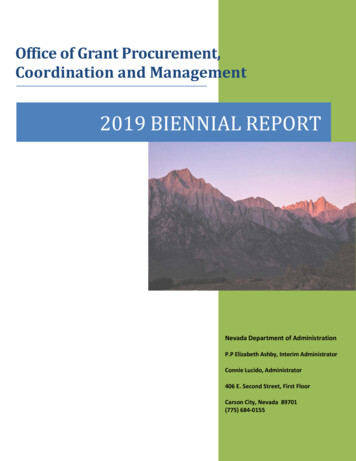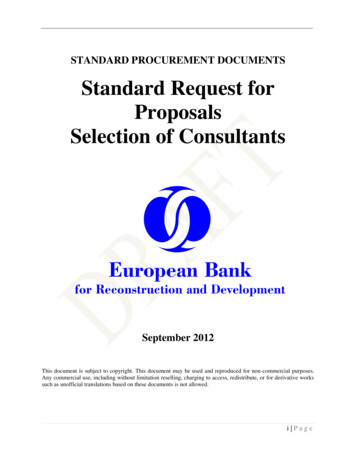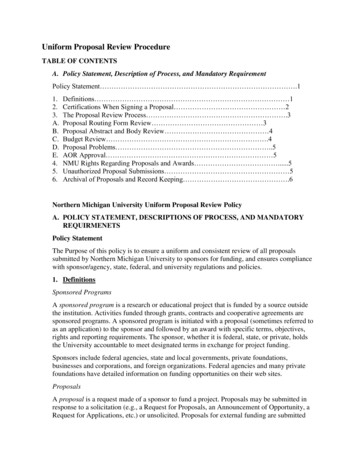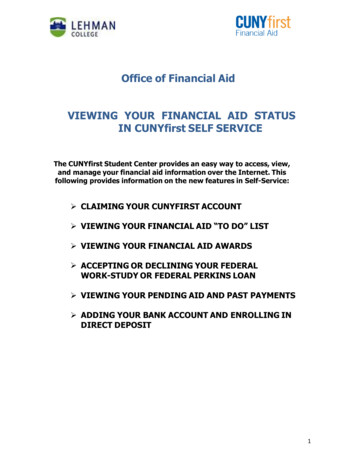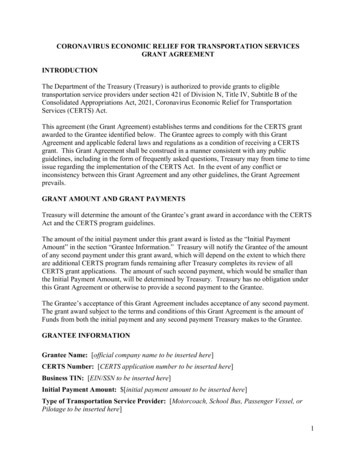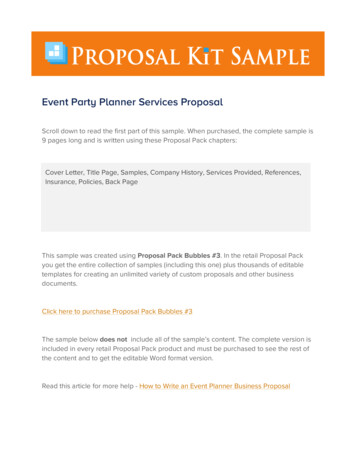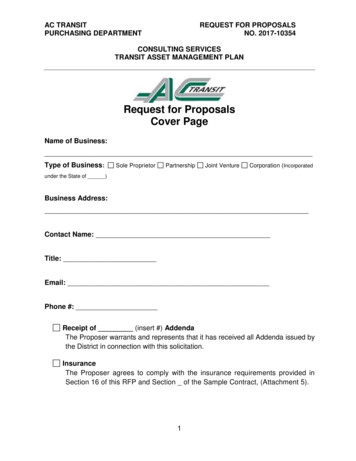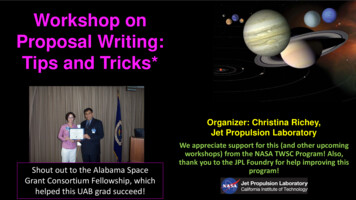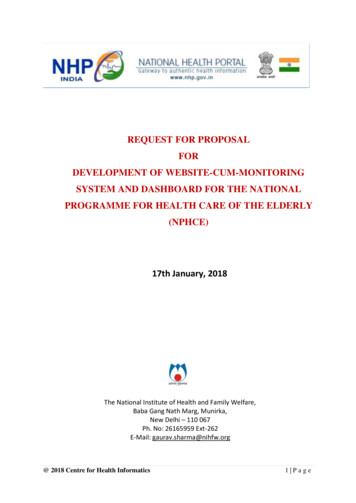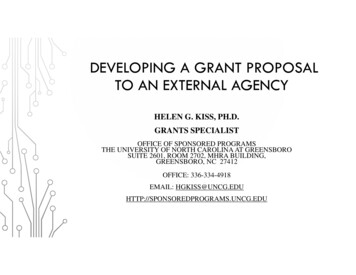
Transcription
DEVELOPING A GRANT PROPOSALTO AN EXTERNAL AGENCYHELEN G. KISS, PH.D.GRANTS SPECIALISTOFFICE OF SPONSORED PROGRAMSTHE UNIVERSITY OF NORTH CAROLINA AT GREENSBOROSUITE 2601, ROOM 2702, MHRA BUILDING,GREENSBORO, NC 27412OFFICE: 336-334-4918EMAIL: HGKISS@UNCG.EDUHTTP://SPONSOREDPROGRAMS.UNCG.EDU
UNCG RESEARCH OFFICES
TODAY’S OVERVIEW OSP Role- Who can assist? GENERAL Guidelines for what a funding proposal MAY need tocontain Each sponsor is DIFFERENT—there is no “standard format” If you need detailed guidance on a specific sponsor, we can do aworkshop on that topic
UNCG RESEARCH OFFICESOffice of Research & Engagement (ORE)Dr. Terri L. Shelton, Vice Chancellor for Research & r-terri-l-shelton)Three Divisions Office of Sponsored Programs (OSP), Dr. Valera Francis, Directorhttp://sponsoredprograms.uncg.edu Office of Research integrity (ORI), Dr. Lisa Goble – Interim uct-of-researchIncludes Export Control (https://exportcontrol.uncg.edu) Office of Innovation & Commercialization (OIC), L. Staton Noel, Directorhttps://innovate.uncg.eduAgreements, Invention disclosures, patents, marketing & licensingOffice of Business Affairs/Financial Services Office of Contracts & Grants (OCG), William Walters, nts
OFFICE OF RESEARCH INTEGRITY Staff: Dr. Lisa Goble – Interim Director/Export Control and COI Official Email: lagoble@uncg.edu / Office: 336-256-1173 Melissa Beck – Assistant Director Email: mdbeck@uncg.edu / Office: 336-256-0253 Please contact the Office of Research Integrity for questions regarding: Human Subjects Research/IRB Website: rd/ Animal Research/IACUC Website: e-and-use-committee/ Conflict of Interest/Export Control Websites: https://coi.uncg.edu/ and https://exportcontrol.uncg.edu/ Responsible Conduct of Research Website: http://integrity.uncg.edu/rcr-training-resources/
OSP MISSION“As the central research administration unit at UNCG,the Office of Sponsored Programs (OSP) supportsinvestigators who have or plan to apply for externalsources of support for their research and scholarlyprojects”. Dr. Valera Francis, Director
OSP STAFF:Tamara Adams, Grants Specialist (Pre-award Budget Review and Preparation)Darneshia Blackmon, Assistant a-blackmon-assistant-directorChristopher Davis, Grants opher-davis-grants-specialistHelen Kiss, Grants Rebecca Libera, Grants a-libera-grants-specialistAubrey Turner, Proposal Development Officer; Julie Voorhees, Proposal DevelopmentSpecialist (Special Projects- developing and submitting large multi-disciplinary and multicenter collaborative grant proposals to a wide range of funding agencies andorganizations. )
RESOURCES TO FIND EXTERNALFUNDING SOURCES Funding search tools: SPIN, GrantSelect, Grant Advisor Plus, Grants.gov, google.com, foundationcenter.org http://uncg.libguides.com/grants http://sponsoredprograms.uncg.edu/databases/ Funding search training: “Show me the money” workshop, 2 or 3 times per g/ Videos: eos/
PROPOSAL GUIDELINESAgency Requirements- GuidelinesRead the GuidelinesRead the GuidelinesFollow the Guidelines- Deadlines- Submission Process- Electronic by Email, Agency Web site (NSF FastLane), PaperWho submits?The University-OSP
EXAMPLES OF AGENCY GUIDELINES(SOLICITED PROPOSALS) Ford Foundation- Grants nts/Supports charitable, educational or scientific work- Grant Inquiry (250 words)- open on-line process- Invitation for a formal proposal National Science Foundation- Scholarships in Science, Tech., Engin., and Math:addresses the need for a high quality STEM workforce in STEM disciplines supported bythe program and for the increased success of low-income academically talented students withdemonstrated financial need who are pursuing associate, baccalaureate, or graduate degrees- Full Proposal deadline- March 30, 2017March 28, 2018
PARTS OF A TYPICAL PROPOSAL Abstract (Summary of the entire proposal) Project Description (narrative) Problem Statement (hypothesis) Project Objectives (expected outcomes) Methodology (detailed plan of action) Project Personnel (who is involved) Institutional Resources/ Facilities Evaluation (Your Success) Dissemination (spread the word) Budget and Justification
ABSTRACT (SUMMARY) Most important part of the proposal Forms the reviewer’s first impression (decisions about whether or not to funda proposal can be made after reading this section) Appears first Up to a one page statement—clear and direct
ABSTRACT The following topics can be addressed: SubjectWhat is the project about? Purpose and SignificanceWhy is this project being undertaken?What is to be accomplished?Why is this important? ActivitiesWhat will be done?What methods will be used? Target PopulationWhat group is being studied or served? Expected OutcomesWhat findings or results will be produced?To whom will these be useful?How will they advance knowledge in your field?
GENERAL PARTS OF A PROPOSAL Abstract (Summary of the entire proposal) Project Description (narrative) Problem Statement (hypothesis) Project Objectives (expected outcomes) Methodology (detailed plan of action) Project Personnel (who is involved) Institutional Resources/ Facilities Evaluation (Your Success) Dissemination (spread the word) Budget and Justification
PROJECT DESCRIPTION Questions to think about: What is the problem/need? Why is it a problem/need? To what extent does the problem/need exist? Who is affected? What has already been done to address this problem/need? Why is this not sufficient? Begin with the broad problem--relate to a smaller problem- differentiate between problem/need on a state/national level and at the locallevel
PROBLEM STATEMENT Provides documentation to establish need- be specific: cite statistics or other relevant data- be analytical: describe strengths, weaknesses, comparisons- demonstrate your familiarity with the field (establish yourcredibility)- if no literature available: Offer explanation for the vacuum,cite closest relevant sources Tips:-grabs the reader & makes him want to continue readingrelates to some larger problem, implies a greater social benefitis of reasonable dimensionsis supported by statistical evidence***minimize the jargon***
PROJECT GOALS AND OBJECTIVES- DEFINED Goals- desired results that a person envisions- It may already be developed by the funding agency Objectives- actions taken to attain goals- specific, achievable, measurable statements- describe expected results/benefits
PROJECT OBJECTIVES Questions to be addressed: What do you propose to do about this problem? When? Where? How? With whom? To what extent? With what expected results? Objectives are:-clear, precise, measurable statementsstatements of the expected outcomes of the projectquestions to be answeredHypotheses (proposed explanations) to be testedpresented in a form which directly parallels your problem statement
METHODOLOGY Questions to be addressed: What is your specific plan of action? How and why did you choose this particular plan? Is it the only way to solve the problem? Did you consider other methods? Can you do what you propose? The methodology section:- is the heart of the proposal- details the methods you will use to reach your objectives- clearly describes (in detail) program activities- must include justification for the choice of method- specifies the time frame for completion of the project- is presented in a format which directly parallels the stated objectives
PROJECT PERSONNEL Two Parts: Related qualification of key project personnel Biographical data sheets (resumes) of key personnel Includes:-key project participants- PI and/or co-PIacademic or other research qualificationshow each participant’s expertise will enable them to carry out the specified objectivespercentage of time each participant will be working on the projectother participants: Postdoctoral researchers, technicians, graduate and undergraduatestudents.
INSTITUTIONAL RESOURCES Shows fit between an institution and projectShows how this institution is the “ideal” place to conduct your projectDescribes the institution’s qualifications or “credibility”Information may include: Background history of institution Statement of the institution’s mission, purpose, goals, philosophy Student population Specific facilities Available equipment Administrative & support services available Associations with other agencies Institution’s competency in project area List of members of Board of Trustees
FACILITIES- TO DO YOUR PROJECTOffice Computers, scannersLaboratory Equipment, bench space, fume hood, suppliesClassroom Computers, video, projectorsIn the Field Field station, other laboratory space, supplies
PROJECT EVALUATION/ASSESSMENT Questions to be addressed: How will you know if your objectives have been reached? What will you do to measure the results? What type of evaluation will you conduct? How will evaluation data be collected? How will you analyze this data? What statistical methods will you use? When will the evaluation occur? Who will perform the evaluation and what are their credentials?
PROGRAM ASSESSMENT & EVALUATIONWho Can Help at UNCG? Office of Assessment, Evaluation, and Research Services (OAERS) at the School of ers consulting services and technical resources in the areas of assessment, programevaluation, and data analysis to individuals and organizations in the Piedmont Triad, NorthCarolina. SERVE Center at UNCG, es reforms to improve teacher preparation, evaluation, recruitment and retention;curricular and professional development programs; and early childhood programs.**Start early and make your contacts during your proposal development stage**
DISSEMINATION Dissemination is the act of making the results known:- to the funder- to the project participants- to your own institution- to other professionals in your field (locally & nationwide)- to the general publicQuestions to be addressed by PI: How will the results of this project be disseminated? To Whom? When? Where?Methods of dissemination include:- journal articles/publications- presentations at professional meetings, conferences, etc.- media presentations- classroom instruction- community engagement
DATA SERVICES: RESEARCH DATA MANAGEMENTFROM UNCG LIBRARIEShttp://uncg.libguides.com/RDM Creating a Data Management Plan- DMPTool – Create, review and share data within your researchcommunity. The DMPTool is a tool for creating ready-to-use data management plans based on the currentrequirements of the major funding agencies (NSF, NIH, etc.). You will need to create a free account to saveyour work. (https://dmp.cdlib.org or https://dmptool.org) Storing your data with Box @ UNCG (http://its.uncg.edu/box)- Box is UNCG’s cloud storage solution. Eachuser gets 50 GB of storage and you can share documents with others (both at UNCG and off-campus). ITS hasalso gathered resources on using and collaborating with Box (http://its.uncg.edu/Box/Help). Archiving your data- NC DOCKS and data: The UNCG University Libraries has a partnership with UNCChapel Hill’s Odum Institute to archive your primary research data. This partnership is free to UNCG faculty,provides long term storage of your data, and integrates with your NC DOCKS profile. The NC DOCKS/Odumpartnership will fulfill most data management plan requirements that are now commonly mandated by grantingagencies (http://libres.uncg.edu/ir/uncg).- Contact: Lynda Kellam, Data Services Librarian, lmkellam@uncg.edu
PARTS OF THE PROPOSAL Abstract (Summary of the entire proposal) Project Description (narrative) Problem Statement (hypothesis) Project Objectives (expected outcomes) Methodology (detailed plan of action) Project Personnel (who is involved) Institutional Resources/ Facilities Evaluation (Your Success) Dissemination (spread the word) Budget and Justification
PROPOSAL BUDGETWhat is a Budget? Financial resources necessary to implement the tasks & activities outlined in theproposal Quantified activities; assign them a dollar valuePreparing a Budget Check program guidelines for:- a budget template- allowable budget items- items that cannot be included in budget- average size of an award or award limitations Must be large enough to cover proposed activities
PROPOSAL BUDGET (CON’T) Includes a numerical budget and a narrative budget justification. Budget items must be accounted for in the budget justification.For every task/activity you have outlined, determine the following: Who will perform the proposed task?- project personnel (PI, co-PI, Postdoc, Technician, Graduate/Undergraduates) How much time will it take?- level of effort (academic year, summer months) What resources will the person(s) need?- non-personnel items to include in budget (examples)
PROPOSAL BUDGET (CON’T)- Materials and Supplies- Directly allocable, allowable, and reasonable for the project.-Travel- Domestic or overseas. Includes lodging, meals, transportation.Equipment- Has a life-expectancy greater than a year and is 5,000. (No F&A)Publications- Relating to the research findings and dissemination.Participant Costs- Stipends, subsistence, travel, registration fees for the participantsor trainees (not UNCG employees) for a conference or training projects.- Tuition and Fees- Graduate Students (by credit hours, in-state vs out of state).- Consultant vs SubcontractorConsultant: Expert outside of UNCG who provides advise or a service & is notinvolved in the overall project.- Subcontractor: Institution or company performs a scope of work and is involved withthe overall project.
PROPOSAL BUDGET (CON’T)Direct Costs- Includes all the costs related to your project (Fringe benefits are adirect cost).Indirect Costs Facilities & Administrative costs- are incurred in conducting orsupporting research and service but they cannot be readily identified asbenefiting particular research or service projects. Budget items not included inthe indirect cost calculation: participant support, tuition, equipment, portion ofeach subcontract in excess of 25,000. UNCG rate is 45.5%Total Costs Direct Costs Indirect Costs
UNCGBUDGETTEMPLATE
BUDGET NARRATIVE Describes how you arrived at the figures (calculations) included in yourbudget and why you need the resources Also referred to as a “Budget Justification” All items included in the budget should be explained in the budget narrative(in the same order listed in the budget) Sub-headings within the text to separate salaries, equipment, materials, travel,etc., helps the reviewers
SAMPLEBUDGETNARRATIVE
QUESTIONS?Visit us at http://sponsoredprograms.uncg.edu
OFFICE OF RESEARCH INTEGRITY Staff: Dr. Lisa Goble - Interim Director/Export Control and COI Official Email: lagoble@uncg.edu / Office: 336-256-1173 Melissa Beck - Assistant Director Email: mdbeck@uncg.edu / Office: 336-256-0253 Please contact the Office of Research Integrity for questions regarding: Human Subjects Research/IRB .

